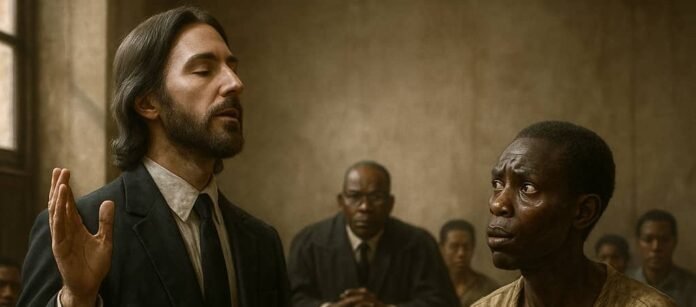By: Isaac Christopher Lubogo
When I first heard the tale in the hallowed corridors of Mitchell Hall, I did not take it as mere coincidence. No—this was not the chatter of young men hungry for drama. It was a testimony carved with the knife of suffering, sharpened by faith, and sealed by mystery.
It began with a frail youth, a wanderer of Kampala’s midnight. His body starved from fasting, his lips cracked, his clothes unwashed, and his soul restless, yet burning in prayer. He had gone for an overnight vigil, hoping heaven would tilt its ear toward his cries. But at 3:00 a.m., instead of angels, the heavy boots of police descended. He had no national ID. No money. No friend. No food. His gaunt appearance, his trembling words, and his empty pockets were enough evidence for suspicion. He was cast into the dungeon of the cell—cold cement, urine-soaked air, and the mockery of fate.
The charge? Undefined suspicion. His crime? Poverty and hunger disguised as guilt.
Two nights he slept there, praying. And on the second night, his testimony shifted into the impossible. He swore to me that as he lay on that cement floor, a figure approached—not in dream, but in waking terror and wonder. A man cloaked in light, speaking not in Hebrew, Greek, or English, but in Lusoga—the language of his mother’s lullabies. “Ndikutumira omuyambi,” the figure said. “I will send you a helper.”
Morning broke, and reality resumed its cruelty. Chains rattled, prisoners shuffled into the courtroom. The magistrate called his name. Alone, he stepped forward, his heart faint. Then—out of nowhere—a gentleman in a sharp black suit rose. No one knew from which bench he came. He introduced himself as counsel, spoke a few polished words in English, and before the young man could understand what was happening, the court clerk was reading out the words: “You are free to go.”
Free? He blinked, rubbed his eyes. It was true. He turned quickly to grasp the hand of his savior, to at least whisper “thank you.” But the suited man was gone—vanished like incense smoke in the wind.
And so the freed man walked to Makerere University, to Mitchell Hall, where destiny placed him before me. Hungry still, penniless still, yet carrying the greatest currency a man can own: a testimony.
The Lubogo Reflection
What happened in that courtroom is not for scholars of logic alone. It is a story that forces us to question the thin veil between the divine and the mundane. Who was that man in the black suit? Was he an angel clothed in the garment of Ugandan advocates? Was he Christ himself, contextualized into the very language of Busoga so the poor man would not mistake the voice? Or was he simply a merciful lawyer, acting under divine compulsion?
But here is the philosophy: God does not always speak in Greek to fishermen, nor in Latin to prisoners. He speaks in the language of your village, in the hunger of your stomach, in the cell of your despair. And when He moves, He does so in ways that leave courts bewildered, police humbled, and prisoners singing Psalms.
The vanishing advocate is a metaphor for hope: unseen, untraceable, yet undeniable. In a city where poverty itself is treated as crime, heaven reminds us that justice is not only the property of courts—it is also the prerogative of God.








